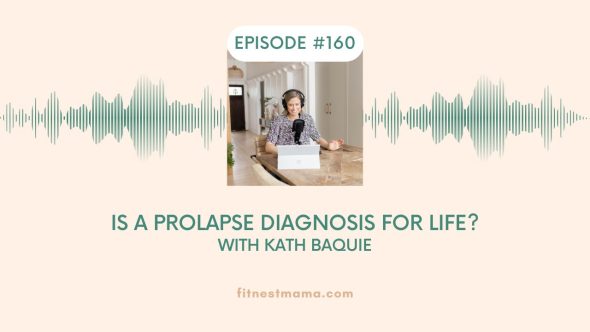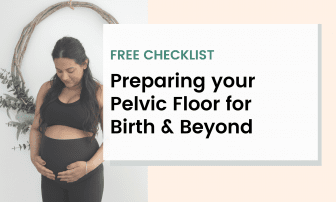If you’ve had a baby or are pregnant, this podcast episode is essential for you. Whether you have symptoms of a prolapse or not, the information here can help you now or in the future. We at FitNest Mama believes in being proactive rather than reactive when it comes to health, and in this post, we will delve into the questions, “Is a prolapse diagnosis for life?” and can you fix or get rid of a prolapse? Let’s find out.
Understanding What a Prolapse Is
A prolapse diagnosis can be intimidating, but it doesn’t need define you, and it shouldn’t limit your lifestyle. A prolapse occurs when the bladder, uterus, or bowel droops down further into the pelvis and vaginal area due to weakened soft tissue structures, ligaments and muscles in the pelvis. Not everyone with a prolapse experiences symptoms, and the severity of the prolapse varies from woman to woman. The prolapse may feel worse on certain days or under specific conditions like prolonged standing, straining during bowel movements, or coughing.
Can You Live Normally with a Prolapse?
The good news is that a prolapse doesn’t have to hinder your life. With proper management and care, you can continue to live normally. It’s essential to be proactive and seek guidance from a pelvic floor physio and/or a doctor if you suspect a prolapse. Early intervention and understanding the right exercises can make a significant difference.
Is a Pelvic Prolapse Permanent or for Life?
The permanence of a prolapse depends on various factors, including its severity and underlying causes. In some cases, lower-grade prolapses may not be symptomatic all the time and can be managed effectively through pelvic floor exercises and other strategies. However, higher-grade prolapses might require additional management options like pessaries or, in some cases, surgical interventions.
Can a Prolapse Go Away?
The resolution of a prolapse depends on individual circumstances. Some women may experience a reduction in symptoms over time with appropriate management, while others may require ongoing care to maintain a comfortable lifestyle. Being proactive with postnatal rehab and pelvic floor exercises is crucial to improving and maintaining pelvic health.
Why is a Prolapse Worse Some Days?
Certain activities or conditions can exacerbate prolapse symptoms. Straining during bowel movements, persistent coughing, or being on your feet all day can put extra pressure on the pelvic floor, leading to increased discomfort. Identifying such triggers can help manage symptoms and improve overall quality of life.
How to Manage and Fix Vaginal Prolapse
There are five key management options to support prolapse:
- During pregnancy, focus on ensuring optimal health of the pelvic floor and core muscles, which includes different aspects of strength as well as flexibility.
- Rest (especially bursts of horizontal rest) during the early postpartum period to allow the body to heal naturally.
- Engage in postnatal rehab exercises to rebuild strength and support the pelvic area.
- Discuss your health conditions and lifestyle with a doctor to manage potential triggers.
- Explore conservative measures like pessaries to help maintain an active lifestyle.
Remember that surgery may be an option for some cases, but it should be considered carefully and complemented with proper prehab and post-rehab exercises. For more information, here is a resource outlining different management options for prolapse.
Summary
In answer to the question, “Is a prolapse diagnosis for life?” the answer is not straightforward. The outcome depends on individual factors, and symptoms may vary over time. However, taking a proactive approach to managing pelvic health, seeking professional advice, and engaging in proper postnatal rehab can significantly improve your quality of life.
A prolapse diagnosis doesn’t have to limit you; with the right care and support, you can continue living an active and fulfilled life. Remember, prevention and proactive management are key to a healthier future.
** This podcast has general information only. Always seek the guidance of your doctor or other qualified health professional with any questions or concerns you may have regarding your health or medical condition.
Podcast Sponsor
This podcast is sponsored by Baby Jogger, who have kindly provided a discount code for 20% off any
full priced product. Discover ultimate versatility with Baby Jogger strollers, designed with the quick original fold – making parents’ lives easier! Tested to extremes and made to last.
Use Code FIT20. Check it out at www.babyjoggerstrollers.com.au.
Episode Links
Preparing for birth Pelvic health checklist
Free 7 Day Trial Pregnancy Workouts
Free 7 Day Trial Postnatal Workouts
Instagram @fitnestmama
This podcast is sponsored by Baby Jogger, who have kindly provided a discount code for 20% off any full priced product. Use Code ‘FIT20’.
Check it out at www.babyjoggerstrollers.com.au.





